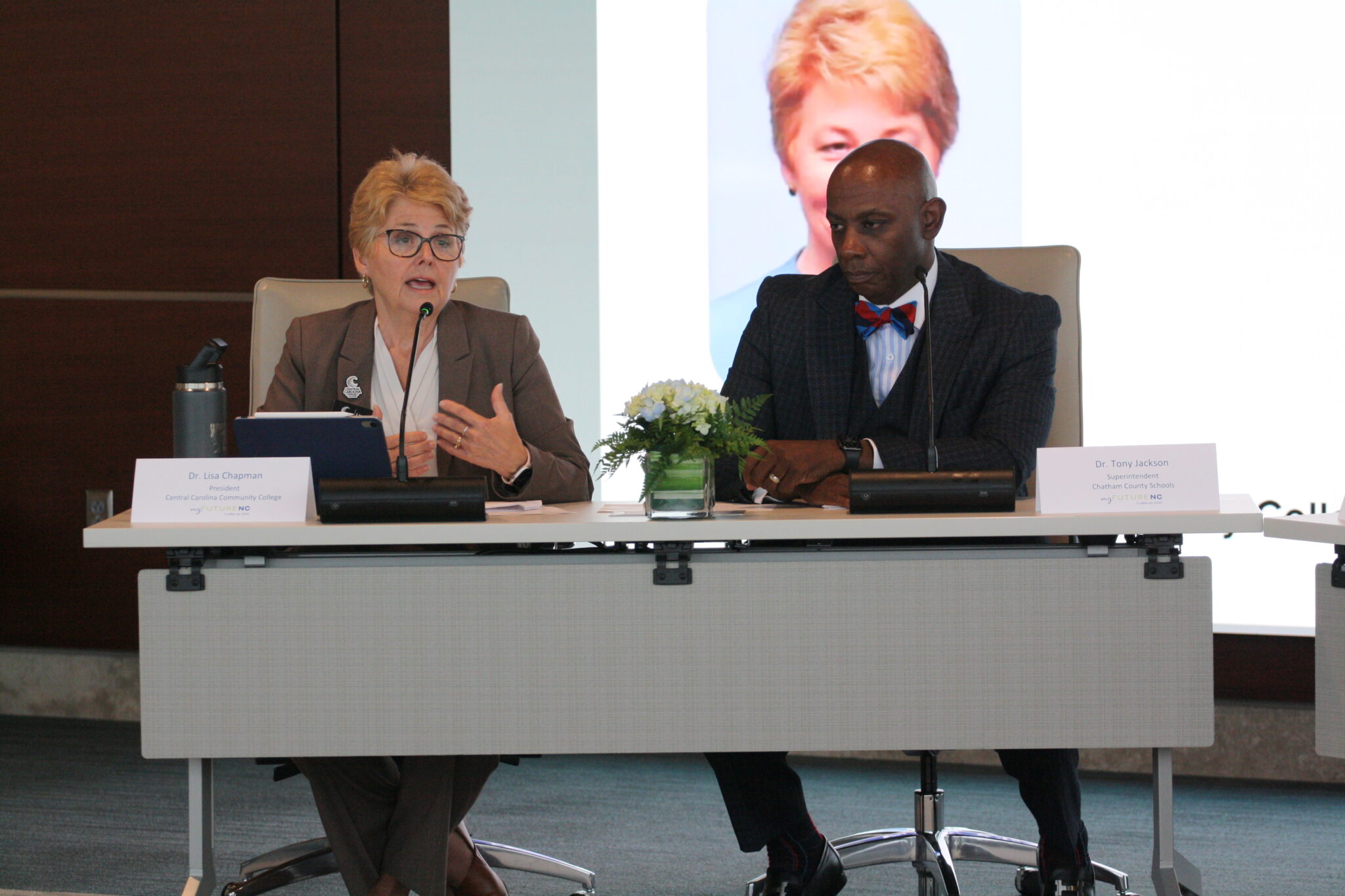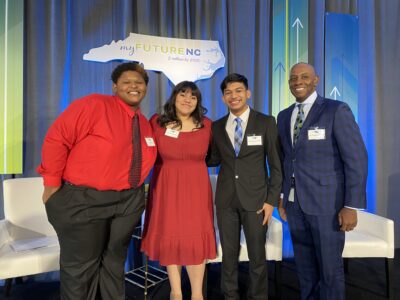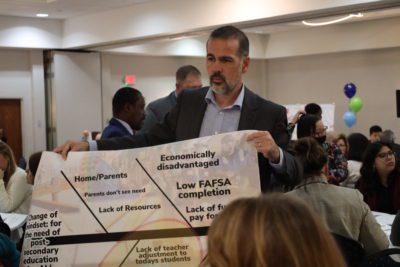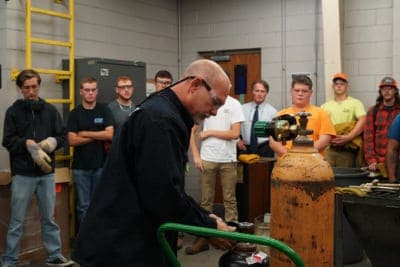
Share this story
- Since myFutureNC's founding in 2019, nearly 200,000 more North Carolinians aged 25-44 have earned a postsecondary degree or credential. That means more than 1.5 million adults in the state are contributing to the attainment goal, according to census data.
- "We need folks across the state in all positions to know our goal and why it matters. Why it matters to individuals that receive a credential or degree, and ... to our labor market and building jobs with North Carolinians," myFutureNC's Melany Stowe said.
|
|
Four years ago, myFutureNC officially became a nonprofit – following the myFutureNC Commission’s Call to Action for a statewide attainment goal of 2 million North Carolinians aged 25-44 with a degree or credential by 2030.
On Monday, the statewide organization celebrated its fourth birthday, along with four years of progress. Since the organization’s founding in 2019, nearly 200,000 additional North Carolinians aged 25-44 have earned a postsecondary degree or credential.
That means more than 1.5 million adults in the state are now contributing to the attainment goal, according to census data.
While myFutureNC celebrated the state’s progress, it also noted the work left to be done.
The extensive work done to date and the way forward would not be possible without the strong cross-sector coordination between myFutureNC, our Board of Directors and Advisory Board of Commissioners, the North Carolina Department of Public Instruction, the community college system, the UNC System, North Carolina Independent Colleges and Universities (NCICU), the State Board of Education, all of our sector partners, among many others.
myFutureNC
myFutureNC has held several events to support the goal, including one in February. More than 1,000 people attended “The State of Educational Attainment in North Carolina” both online and in person in Raleigh.
Following the event, myFutureNC received multiple invitations to give presentations at the local, regional, and state level, Stowe said. The organization was mentioned 52 times by media in the two weeks after the event, she said, with a potential reach of 7.94 million people.
“Why does that matter? It matters because we cannot achieve the goal to 2 million by 2030 alone,” Melany Stowe, myFutureNC’s director of marketing and communications, said. “We need folks across the state in all positions to know our goal and why it matters. Why it matters to individuals that receive a credential or degree, and why it matters to our labor market and building jobs with North Carolinians.”
Before, during, and after the pandemic, EdNC previously reported, the state’s attainment goal has been one issue state leaders agree on.
Based on census data, North Carolina remains 444,000 individuals short of reaching the 2030 goal. The state is 31,000 skilled workers behind where it needs to be to stay on track to meet the goal, according to a February press release.
“North Carolina is blessed with a booming economy, yet we still have too many adults who lack the training and skills needed,” Cecilia Holden, CEO and president of myFutureNC, said at the February event. “This statewide challenge cannot be solved by one group or person. It will take all of us working together.”
According to myFutureNC, the most recent data show that for every 100 public school students in ninth grade in North Carolina, only 28 will earn a degree or credential within six years of graduating high school.
Meanwhile, community college enrollment is still down 10% since before the pandemic. Jobs requiring a postsecondary degree or credential are projected to increase by 12% by 2030, according to myFutureNC.
“So the event was successful,” Stowe said on Monday. “But now we’ve got work to do. We have work to do, and really establishing who we are as an organization.”



The work being done
Based on historical data, the state is projected to come up 80,000 people short of its 2 million goal, Chair John Fraley said on Monday, citing new data from Carolina Demography.
In light of that, Fraley said the organization must continue to focus on keeping students enrolled after high school.
“It’s easier to keep students on track while you have them then it is to find adult learners and bring them back into the classroom,” he said. “And it’s the right thing to do for the students. On-time enrollment remains critical for North Carolina’s ongoing success, so we are always playing catch-up.”
On Monday, myFutureNC added three priorities to its legislative agenda: supporting N.C. Workforce Credentials, simplifying and strengthening financial aid and completion supports, and expanding high-demand programs of study.
The organization also discussed three “big bets” in working toward meeting the 2 million goal: on-time enrollment, adult learners, and labor market alignment.
On-time enrollment is an indicator of the share of graduates on a traditional postsecondary path, which means they transition to postsecondary education in the fall after high school graduation. According to the National Student Clearinghouse Research Center (NSCRC), the on-time enrollment rate declined from 60.5% in 2019 to 56.5% in 2020.
Shelby Armentrout, the chief of staff at DPI, spoke about the system’s commitment to their students’ postsecondary plans, including dual enrollment, student career planning, and efforts to better align with the workforce.
“We are so committed to ensuring all North Carolina public school students are well equipped to receive the postsecondary education or alternative plan of their choice,” Armentrout said. “We all know that jobs that pay a family-sustaining wage require more than a high school diploma.”
Kim Gold, NCCCS chief of staff, spoke about the system’s work to reach adult learners across the state.
More than 39 million adults in the U.S. have at least some college credit and no degree or credential, according to the National Student Clearinghouse Research Center. There were slightly more than 1 million North Carolina adults with some college but no degree or credential as of July 2020. Nearly 34% of those adults are younger than 35, and about 54% are ages 35 to 64.
NCCCS leaders say that reaching adult learners – or students older than 25 – is key to increasing enrollment and statewide attainment, and in turn, decreasing workforce shortages.
NCICU President Hope Williams joined Gold in framing the Board’s discussion of adult learner enrollment and persistence. Finally, three representatives with Surry-Yadkin Works, Surry Community College President David Shockley, Surry County Schools Superintendent Travis Reeves, and Yadkin County of Commissioners Chair Kevin Austin, spoke about the importance of labor market alignment, or the alignment between the skills of graduates and the needs of employers.
North Carolina’s labor market alignment was 84% in the most recently available data, per myFutureNC’s website. That means roughly eight of every 10 graduates from state postsecondary institutions had skills and credentials aligned with job openings.
By 2030, the goal is that North Carolina’s labor market alignment rate will be 85%.
One promising practice
Near the end of Monday’s meeting, Central Carolina Community College President Lisa Chapman and Chatham County Schools Superintendent Tony Jackson spoke about Central Carolina Connections.
The college and school district are working together to meet the demand of rapid job growth expected in the coming years, while also connecting their students and residents to meaningful, high-paying work.
The College Connections Experience is a no-cost program designed to offer a cohort of incoming freshmen the chance to prepare for college life, focus on career exploration, earn free summer course credit, enrich their academic skills, and have FUN with new friends! This cohort will have additional opportunities beyond the summer to stay engaged socially during their time at college.
Central Carolina Community College’s website
“In our work together, we are extremely bullish on ensuring that not only are we preparing our students for the high school completion, but that we’re preparing them to be lifelong learners,” Jackson said.
Jackson also spoke about the success of AVID in Chatham, or Advancement Via Individual Determination. The system helps students learn strategies to help them succeed in school, postsecondary education, and throughout life. Chatham’s AVID program received national recognition last December.
Chapman spoke about the importance of sharing the many student success stories with the community.
“Part of the problem is stigma. These are really good jobs, really great careers,” she said. “We’ve got residents who are incredibly talented… we need to connect those. And we need your help in connecting those. We need people to understand that a manufacturing environment can potentially provide a great career.”


You can read myFutureNC’s full educational attainment report here.





